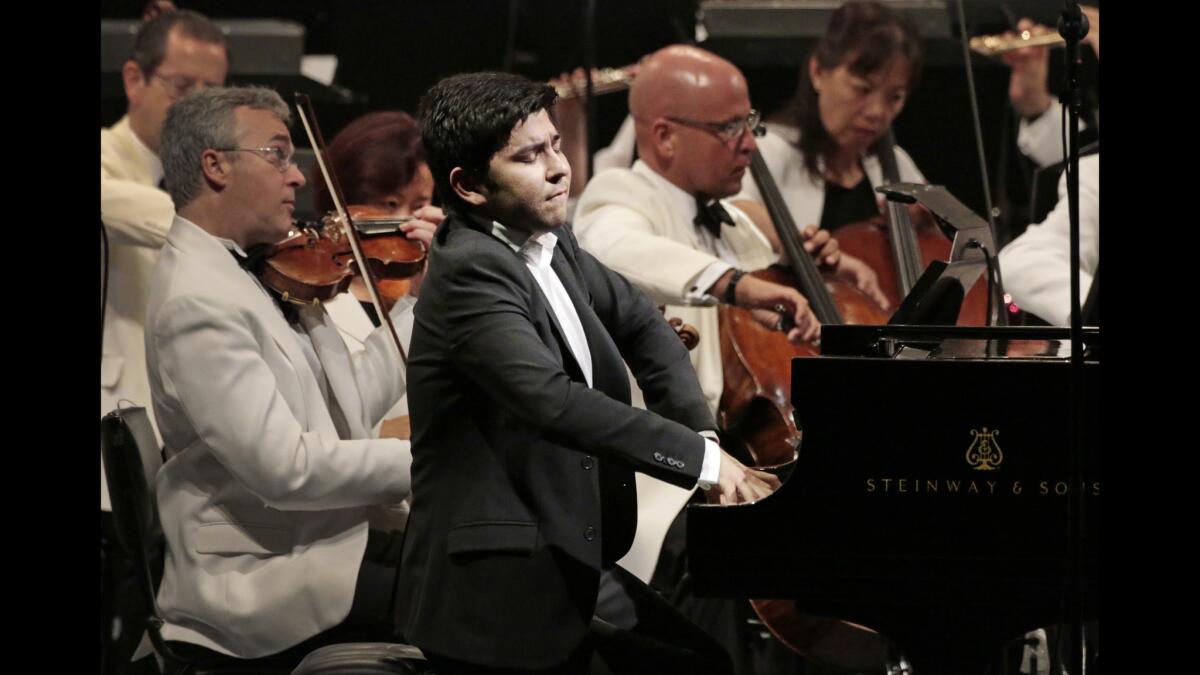Review: At the Hollywood Bowl, a young piano virtuoso tackles Rachmaninoff alongside the L.A. Phil

You knew this would come our way eventually. Behzod Abduraimov, the 26-year-old Uzbeki keyboardist who made his splash in the piano world in the usual way â tackling the big Russian piano concertos â got around to bringing the biggest of the bunch, the Rachmaninoff Piano Concerto No. 3, to the Hollywood Bowl Tuesday night.
The piece remains a draw, attracting what looked like a somewhat bigger-than-usual turnout for a Classical Tuesday Bowl concert that does not involve Gustavo Dudamel. The lingering aftereffects of âShineâ is one reason, but even before the film came out two decades ago, the so-called Rach 3 had been gaining in public appeal thanks to the spectacular advocacy of several superstar pianists.
Abduraimov cunningly did not put all his cards on the table in the opening minutes of the first movement, rolling along at a relatively swift tempo within the fabric created by Krzysztof Urbanski and the Los Angeles Philharmonic without calling attention to the finger-busting technical challenges. But those who keep score on pianistic issues were lying in wait, wondering which cadenza Abduraimov would play.
There are two of them in the printed score â one a fairly light-textured fantasia, the other a heavy, fiercely difficult thing full of leaping chords for large hands â both of which come together in a single towering peroration. Not very many pianists have chosen the tougher cadenza. The mighty Horowitz didnât. Even Rachmaninoff himself didnât in his 1939-40 recording. Abduraimov did, plunging in with a smashing, unified account full of fire that also left room for subtle touches and finally the most delicate of arpeggios.
From this point onward, the performance acquired more intensity, with a lot of motor energy and drive kicking in as the third movement got underway. Sometimes Abduraimovâs hands were moving so fast that they appeared blurred on the video screens. Yet he was also composed enough to find poetry in the calmer stretches before peeling off the huge chords and octaves of the final minutes with as much bravura and even eloquence as one would want. All things considered, Abduraimov triumphed again.
After intermission came more standard Russian fare, Mussorgskyâs âPictures at an Exhibition.â Occasionally, even outdoors, someone tries out a different orchestration, but Ravelâs remains the default choice most of the time â as it was on this evening.
Urbanski, who is about to start his seventh season at the head of the Indianapolis Symphony, strolled through the much-traveled art gallery at a conventional, at times leisurely pace. The âChicksâ chirped offhandedly, the âLimogesâ marketplace didnât bustle much, âBaba Yagaâ had only a minimum of dynamism, and so on. The bell sounds in âThe Great Gate of Kievâ came from two suspended, miked, rectangular sheets of metal on either side of the stage that when struck, made a satisfying dull bong.
A routine performance of âPictures,â alas. Yet such is the current high state of the Philharmonic that even when inspiration was at less than full strength, the orchestra played consistently well.
SIGN UP for the free Essential Arts & Culture newsletter Âť
Support coverage of the arts. Share this article.
More to Read
The biggest entertainment stories
Get our big stories about Hollywood, film, television, music, arts, culture and more right in your inbox as soon as they publish.
You may occasionally receive promotional content from the Los Angeles Times.










